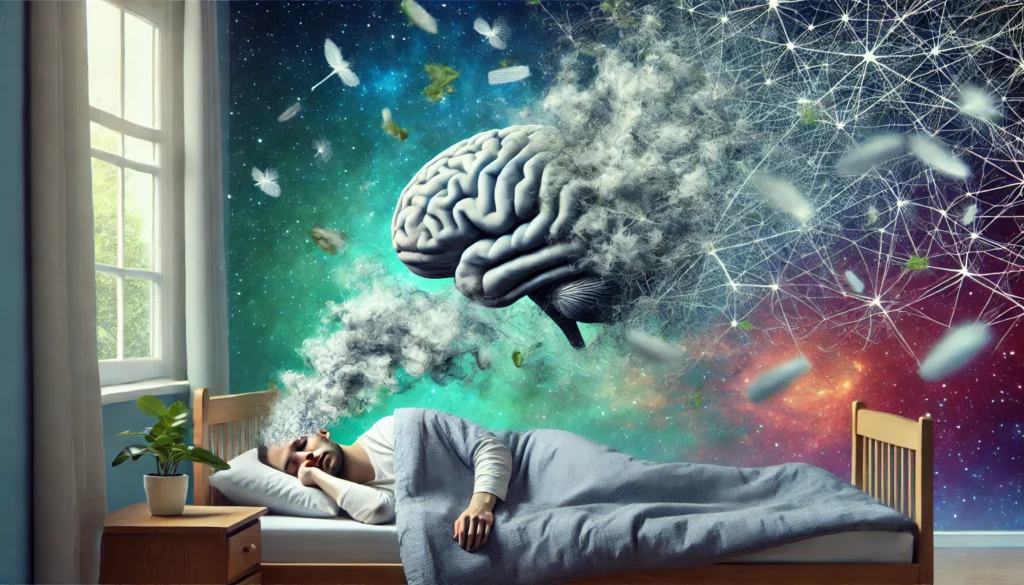Lunesta, generically known as eszopiclone, is a popular prescription medication used for the treatment of insomnia. It belongs to a class of drugs known as sedative-hypnotics, which work by slowing down brain activity to help users fall asleep more easily and maintain sleep throughout the night. The drug is widely prescribed due to its efficacy in improving sleep quality, making it a go-to solution for those struggling with sleep disturbances.
You may also like: Understanding the Science Behind Lost Memory
How Lunesta Works: Mechanisms of Action
Lunesta’s effectiveness lies in its ability to modulate the action of neurotransmitters in the brain, particularly gamma-aminobutyric acid (GABA). GABA is an inhibitory neurotransmitter that calms nervous activity. By enhancing GABA’s effects, Lunesta reduces the time it takes to fall asleep and increases the duration of sleep. This mechanism is similar to that of benzodiazepines, though Lunesta is often preferred for its reduced risk of dependency.
Prescription Trends and Usage Patterns
The rise in Lunesta prescriptions can be attributed to increasing awareness of sleep disorders and their impact on health. Insomnia affects millions worldwide, leading to a demand for effective treatments. Lunesta is often prescribed for short-term use, yet many patients continue its use beyond the recommended period. Understanding how patients use Lunesta can help identify patterns that may contribute to potential risks.
Side Effects and Considerations
While Lunesta is generally well-tolerated, it does have potential side effects. Common issues include drowsiness, dizziness, and a metallic taste in the mouth. More serious side effects, though rare, can include complex sleep behaviors like sleepwalking. Patients must discuss these risks with their healthcare provider and report any unusual symptoms promptly.
The Dementia Dilemma: What Do We Know?
Does Lunesta Cause Dementia?
The concern over whether Lunesta and similar sleeping pills can lead to dementia stems from broader questions about the long-term effects of sleep medications. While direct evidence linking Lunesta specifically to dementia is limited, studies have raised concerns about the potential cognitive risks associated with prolonged use of sedative-hypnotic drugs.
Exploring Scientific Studies
Various studies have attempted to explore the link between sedative-hypnotics like Lunesta and dementia. Some research has identified a potential association between long-term use and cognitive decline, while others have found no significant evidence. This inconsistency highlights the need for more comprehensive research to understand the full impact of these medications on brain health.
The Role of Dosage and Duration
The risk associated with Lunesta may be influenced by dosage and duration of use. Higher doses and prolonged use might increase the likelihood of adverse cognitive effects. Patients are advised to adhere to prescribed dosages and to avoid long-term use unless absolutely necessary, highlighting the importance of regular consultations with healthcare providers.
Individual Susceptibility and Risk Factors
Not all individuals may face the same risk when using Lunesta. Factors such as age, genetics, and pre-existing health conditions can influence susceptibility to cognitive side effects. Understanding these individual risk factors is crucial for tailoring treatment plans and minimizing potential harm.
The Broader Context: Do Sleeping Pills Cause Dementia?
Research exploring the relationship between sleeping pills and cognitive decline is ongoing. Some studies suggest that long-term use of certain sleep medications may be associated with an increased risk of dementia. However, it is crucial to note that correlation does not imply causation. Factors such as underlying health conditions, lifestyle choices, and other medications can also contribute to cognitive decline.
Differentiating Between Correlation and Causation
Many studies find correlations between sleeping pill use and dementia, but distinguishing correlation from causation is critical. Factors such as pre-existing sleep disorders or mental health issues might contribute to both the need for sleeping pills and cognitive decline, complicating the interpretation of findings.
Lifestyle and Health Factors
It’s important to consider the broader context in which sleeping pills are used. Factors like diet, exercise, mental health, and social engagement all play roles in cognitive health. People who rely on sleep aids might also have other habits that influence their cognitive trajectory, necessitating a holistic approach to understanding risks.

The Influence of Comorbid Conditions
Comorbid conditions such as anxiety, depression, and cardiovascular diseases can interplay with the use of sleeping pills and cognitive decline. These conditions might not only necessitate the use of sleep aids but also independently contribute to the risk of dementia. A comprehensive health assessment is vital for patients using sedative-hypnotics long-term.
Examining the Evidence
Can Ambien and Other Sleep Aids Cause Dementia?
Ambien, like Lunesta, is another sedative-hypnotic commonly prescribed for insomnia. Studies investigating the link between Ambien and dementia have yielded mixed results. Some research indicates a potential association between long-term use and cognitive impairment, while other studies find no significant evidence to support this claim.
Comparative Studies on Different Sleep Aids
Comparative studies on Ambien and other sleep aids provide mixed results regarding dementia risk. Some research points to a heightened risk with prolonged use, while others find no significant cognitive decline. These discrepancies highlight the complexity of pharmacological impacts on the brain and the need for individualized assessments.
The Importance of Patient Education
Patient education is paramount when prescribing sleep aids like Ambien. Understanding the potential risks and benefits enables patients to make informed decisions. Healthcare providers should discuss alternative treatments and the importance of regular follow-ups to monitor cognitive health, ensuring that sleep aids are used safely.
Seeking Alternative Sleep Solutions
For some, the potential risks of sleep aids outweigh the benefits. Exploring alternative sleep solutions, such as improving sleep hygiene, cognitive behavioral therapy, and lifestyle modifications, can help reduce reliance on medications. These alternatives can be effective in managing insomnia without the associated cognitive risks.
Does Buspirone Cause Dementia?
Buspirone, an anti-anxiety medication sometimes used off-label for sleep issues, has not been directly linked to dementia. However, like any medication, it is essential to weigh the benefits and risks with a healthcare provider, especially when considering long-term use.
Understanding Off-Label Use
Off-label use of medications like Buspirone for sleep issues is common but requires careful consideration. While it can be beneficial for some, the lack of specific approval for insomnia means that the long-term effects are not well-documented. Patients should discuss the potential benefits and risks with their healthcare provider before starting such treatments.
Assessing Risk-Benefit Ratios
Every medication comes with a risk-benefit ratio that needs careful evaluation. For Buspirone, understanding how it interacts with an individual’s health profile and the potential impact on cognitive function is crucial. This involves regular health assessments and open communication between patients and healthcare providers.
Monitoring Cognitive Health in Long-Term Use
Long-term use of any medication requires vigilance in monitoring cognitive health. Regular cognitive assessments can help detect early signs of cognitive decline, allowing for timely intervention. Patients using Buspirone or any long-term medication should be proactive in discussing any cognitive concerns with their healthcare provider.
Hydroxyzine Memory Loss Concerns
Hydroxyzine, an antihistamine with sedative properties, has been reported to cause memory problems in some users. While not directly linked to dementia, its impact on cognitive function underscores the importance of careful monitoring and consultation with healthcare professionals.
Mechanisms of Memory Impairment
Hydroxyzine may cause memory impairment through its sedative effects, which can impact brain function. Understanding these mechanisms is important for patients and healthcare providers to make informed decisions about its use. Patients should be aware of potential memory issues and discuss any concerns with their healthcare provider.
Identifying At-Risk Populations
Certain populations may be more susceptible to memory issues with Hydroxyzine, such as older adults or those with pre-existing cognitive conditions. Identifying these at-risk groups can help tailor treatment plans and minimize potential cognitive side effects. Healthcare providers should assess individual risk factors when prescribing Hydroxyzine.
Strategies for Minimizing Cognitive Risks
To minimize cognitive risks, it is essential to use the lowest effective dose of Hydroxyzine for the shortest duration necessary. Regular follow-ups and cognitive assessments can help ensure that any potential memory issues are identified early. Patients should also explore alternative treatments and lifestyle changes to support cognitive health.
The Role of Sleep Quality and Cognitive Health
Can Poor Sleep Contribute to Dementia?
Sleep quality is closely tied to cognitive health. Chronic sleep disturbances have been associated with an increased risk of cognitive decline and dementia. Ensuring adequate sleep hygiene and addressing sleep disorders proactively may help mitigate these risks.

The Science of Sleep and Brain Health
Research shows that sleep plays a critical role in brain health, supporting memory consolidation and clearing toxins. Poor sleep quality can disrupt these processes, potentially accelerating cognitive decline. Understanding the science behind sleep and its impact on the brain can inform strategies for maintaining cognitive health.
Identifying and Addressing Sleep Disorders
Common sleep disorders like sleep apnea and insomnia can significantly impact cognitive health. Identifying these disorders early and implementing effective treatments is crucial for reducing the risk of dementia. Healthcare providers should encourage patients to seek assessment and treatment for any sleep issues.
The Benefits of Good Sleep Hygiene
Implementing good sleep hygiene practices can improve sleep quality and support cognitive health. Simple changes like maintaining a regular sleep schedule, creating a restful environment, and avoiding stimulants before bed can have significant benefits. Patients should be encouraged to adopt these practices as part of a comprehensive approach to sleep health.
Long-Term Ambien Use and Dementia: A Cautionary Tale
For individuals using Ambien or similar medications over extended periods, it is advisable to regularly evaluate the necessity and dosage with a healthcare provider. Exploring alternative sleep strategies and lifestyle modifications may also be beneficial in reducing reliance on sleep aids.
The Risks of Prolonged Medication Use
Long-term use of medications like Ambien can lead to dependency and potential cognitive risks. Understanding these risks and the importance of regular evaluations can help mitigate potential negative outcomes. Healthcare providers should work with patients to assess the ongoing need for medication and explore alternative treatments.
Exploring Lifestyle Modifications
Lifestyle modifications, such as stress reduction techniques, regular physical activity, and dietary changes, can positively impact sleep quality. Encouraging patients to adopt these changes can reduce reliance on sleep aids and support overall health. Healthcare providers should guide patients in implementing these strategies as part of their treatment plan.
The Role of Cognitive-Behavioral Therapy
Cognitive-behavioral therapy for insomnia (CBT-I) is an effective alternative to medication for many patients. CBT-I addresses the underlying causes of insomnia and provides tools for improving sleep quality without medication. Patients should be informed about CBT-I as a viable option for managing chronic insomnia.
Future Implications and Practical Advice
Balancing Risks and Benefits
The decision to use sleep medications like Lunesta should be made collaboratively with a healthcare provider, considering individual health needs and potential risks. Exploring non-pharmacological interventions, such as cognitive-behavioral therapy for insomnia (CBT-I), can offer effective alternatives without the associated cognitive risks.
Informed Decision-Making in Sleep Treatment
Informed decision-making involves understanding the potential risks and benefits of sleep medications and alternative treatments. Patients should be encouraged to engage in open discussions with their healthcare providers about their sleep needs and treatment options. This collaborative approach ensures that treatment plans are tailored to individual health profiles.
Evaluating Non-Pharmacological Alternatives
Non-pharmacological alternatives, such as CBT-I, meditation, and relaxation techniques, can effectively improve sleep quality without medication. Patients should be informed about these options and encouraged to explore them as part of their treatment plan. Healthcare providers can guide patients in implementing these strategies to support sleep health.
The Importance of Regular Health Reviews
Regular health reviews are essential for patients using sleep medications long-term. These reviews provide an opportunity to assess the ongoing need for medication, monitor for potential side effects, and explore alternative treatments. Patients should be proactive in scheduling regular check-ins with their healthcare provider to ensure safe and effective treatment.
Staying Informed and Proactive
As ongoing research continues to unravel the complexities of sleep medications and cognitive health, staying informed and proactive is essential. Health and wellness coaches, science journalists, and biohackers can play a pivotal role in disseminating accurate information and promoting informed decision-making.
The Role of Science Communication
Science communication plays a crucial role in translating complex research into accessible information for the public. Health and wellness professionals can help bridge the gap between research and practice, ensuring that patients have access to accurate and up-to-date information. This empowers patients to make informed decisions about their health.
Engaging in Continued Education
Continued education is vital for both healthcare providers and patients to stay informed about the latest research and treatment options. Healthcare providers should engage in ongoing professional development, while patients should seek out reliable sources of information to stay informed about their treatment and health.
Building a Supportive Community
Building a supportive community of healthcare providers, patients, and advocates can enhance the dissemination of information and support informed decision-making. Collaborative efforts between these groups can promote a comprehensive understanding of sleep health and cognitive well-being, empowering individuals to make choices that prioritize their health.
Conclusion
In conclusion, while concerns about the link between Lunesta and dementia warrant attention, it is crucial to approach the topic with a balanced perspective. Understanding the broader context of sleep medications and cognitive health, evaluating individual risks, and exploring alternative sleep solutions are key steps in safeguarding cognitive well-being. By staying informed and collaborating with healthcare professionals, individuals can make informed choices that prioritize both sleep quality and long-term cognitive health.
Emphasizing Individualized Care
Emphasizing individualized care is crucial in addressing the complexities of sleep medication use and cognitive health. By tailoring treatment plans to individual needs and circumstances, healthcare providers can help minimize risks and optimize outcomes. Patients should feel empowered to advocate for their health and seek personalized care that aligns with their unique needs.
Encouraging Ongoing Research
Encouraging ongoing research into the long-term effects of sleep medications on cognitive health is essential for advancing our understanding and improving treatment options. Support for research efforts can help uncover new insights and inform clinical practices, ultimately benefiting patients and healthcare providers alike.

Promoting a Holistic Approach to Health
Promoting a holistic approach to health that integrates physical, mental, and emotional well-being can enhance both sleep quality and cognitive health. By addressing lifestyle factors, stress management, and overall wellness, individuals can support their health and reduce reliance on medications. Healthcare providers can play a key role in guiding patients toward a holistic approach to health and well-being.
Further Reading:
Sleeping pill reduces levels of Alzheimer’s proteins
Do Sleeping Pills Increase the Risk of Dementia?
Important Note: The information contained in this article is for general informational purposes only, and should not be construed as health or medical advice, nor is it intended to diagnose, prevent, treat, or cure any disease or health condition. Before embarking on any diet, fitness regimen, or program of nutritional supplementation, it is advisable to consult your healthcare professional in order to determine its safety and probable efficacy in terms of your individual state of health.
Regarding Nutritional Supplements Or Other Non-Prescription Health Products: If any nutritional supplements or other non-prescription health products are mentioned in the foregoing article, any claims or statements made about them have not been evaluated by the U.S. Food and Drug Administration, and such nutritional supplements or other health products are not intended to diagnose, treat, cure, or prevent any disease.


